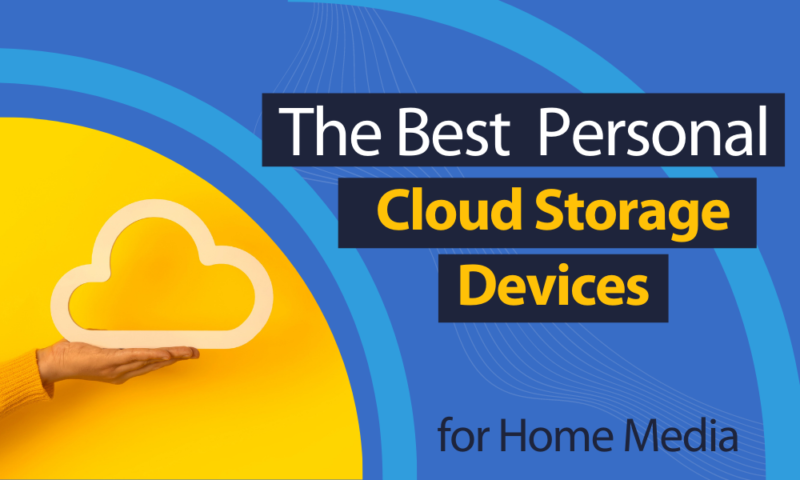The Best Personal Cloud Storage Devices for Home Media in 2024
Cloud storage has changed the way we store our data and has made accessing files from anywhere a breeze. However, they come with monthly fees and are sometimes prone to lapses in security. Today, we’re offering a better solution by looking at five of the best personal cloud storage devices for the home.
Whether you’re already using cloud storage or not, most people can relate to at least one of the main reasons that people have become so fond of it in recent years. Either you’re looking for more free storage space, or are trying to backup precious files like family photos or critical work files. Regardless of what your reason for wanting cloud storage is, using the best personal cloud storage device is often a better option than going with a subscription-based cloud storage service.
Key Takeaways:
- Personal cloud storage is a great way to break free from a monthly subscription fee and take control of your files into your own hands.
- Keep in mind that, in most cases, these units do not come with built-in storage and you must purchase the hard drives separately.
- Different storage devices will offer different benefits, whether you’re aiming to backup your photos or preserve important work.
With personal cloud storage, you can skip the monthly fee and take control of your files into your own hands. Rather than your files being stored on a server owned by someone else in some faraway place, you can store your files on your own personal cloud device right in your home. This improves security and can save some money in the long run, as well.
Our top pick for the best personal cloud storage device is the Asustor Lockerstor 2 , but the Western Digital My Cloud is the cheapest option. Read on to learn what you should know before picking a cloud storage device and see our top picks for personal cloud storage.
-
08/10/2021
Four of the models we’re looking at are brand new to this list. The only returning storage device is the Western Digital My Cloud, which has changed considerably since we last checked it out.
What Is Personal Cloud Storage?
With standard cloud storage, your files are uploaded to and stored on a server along with tons of other people’s data. If you use Google Drive (read our Google Drive review), for example, all of those files will be stored somewhere on a Google server.
With personal cloud storage, you’re the one who owns and controls the physical device where your data is being stored. These units are a type of network attached storage, or NAS. If a NAS can be used not only from the local network but also remotely, it is also called a personal cloud (see our best NAS cloud backup list and guide on how to backup NAS devices to the cloud).
The ability to access your storage remotely allows you to do things like backup your phone’s photos from anywhere, access files on your home network while away and much more. This helps to keep your data more private than if it were being uploaded onto a cloud storage service. Many people are uneasy with the idea of their files being stored on a server that is out of their control and in some unknown location.
Additionally, cloud breaches occur from time to time and valuable data can be lost. Keeping your files on a secure device in your home gives you greater control over who has access to them and gives you peace of mind knowing that a company isn’t doing anything fishy with your information.
Another obvious benefit of having your own personal cloud storage is that you no longer have to worry about a subscription fee. Once you purchase the device and get things set up, you’ll have your own cloud storage for as long as you keep the device in working condition.
How Much Does Personal Cloud Storage Cost?
The up-front cost of personal cloud storage is high when compared to the monthly cost of cloud storage services, but depending on how long you plan to use it and how much storage you need, it can pay for itself in the long run.
The cheapest device on our list is the Western Digital My Cloud, which costs less than $200 with the storage included. The other devices on our list are more expensive, but it’s important to note that on top of the cost of the device, most do not come with their own drives.
Most network attached storage devices require you to purchase hard drives separately and install them yourself. This is not a complicated procedure in any way — you simply have to plug the drives in and place them in their mounts in the NAS. However, this does add an additional and highly variable cost to the equation.
The cost will be affected by your choice of hard drives or faster solid state drives — as well as the amount of storage you decide to put into your NAS.
What Makes the Best Personal Cloud Storage Device?
Every one of the storage devices that made it onto this list must have the ability to store at least several terabytes of stuff and provide you with the ability to access it remotely, either through a web interface or, better yet, an app or program.
Additionally, each storage device supports various operating systems, making it easy to sync your data whether you’re a Windows user, Mac user or even have different computer systems running on different operating systems and need to share files across multiple devices.
- Asustor Lockerstor 2 — Best overall personal cloud storage device
- Synology DiskStation DS220j— Well-rounded, middle-ground cloud storage
- Terramaster F5-422 Network Storage Server— Massive storage for power users or businesses
- Western Digital My Cloud Home Personal Cloud— Simple and cheap personal cloud
- QNAP TS230— Innovative software for organizing photos and videos
In addition to the basic features every cloud storage device on our list has, each one has some standout features that are worth looking out for. Which device is best for you will depend on your needs, and the extra bells and whistles that each one offers might line up with some better than others.
The QNAP TS230, for example, offers a unique and excellent software that you can use to automatically sort your photo library. The Terramaster, on the other hand, has unbelievable read and write speeds, which is great for someone like a video editor who might frequently be moving large 4K files to and from their storage.
Each of these devices made our list for some unique reason or standout feature, so keep that in mind while reading through.
Top 5 Personal Cloud Storage Devices
Now that we’ve got a good idea of the basics and what to look for, let’s dive into our top five devices and see what each one brings to the table.
1. Asustor Lockerstor 2
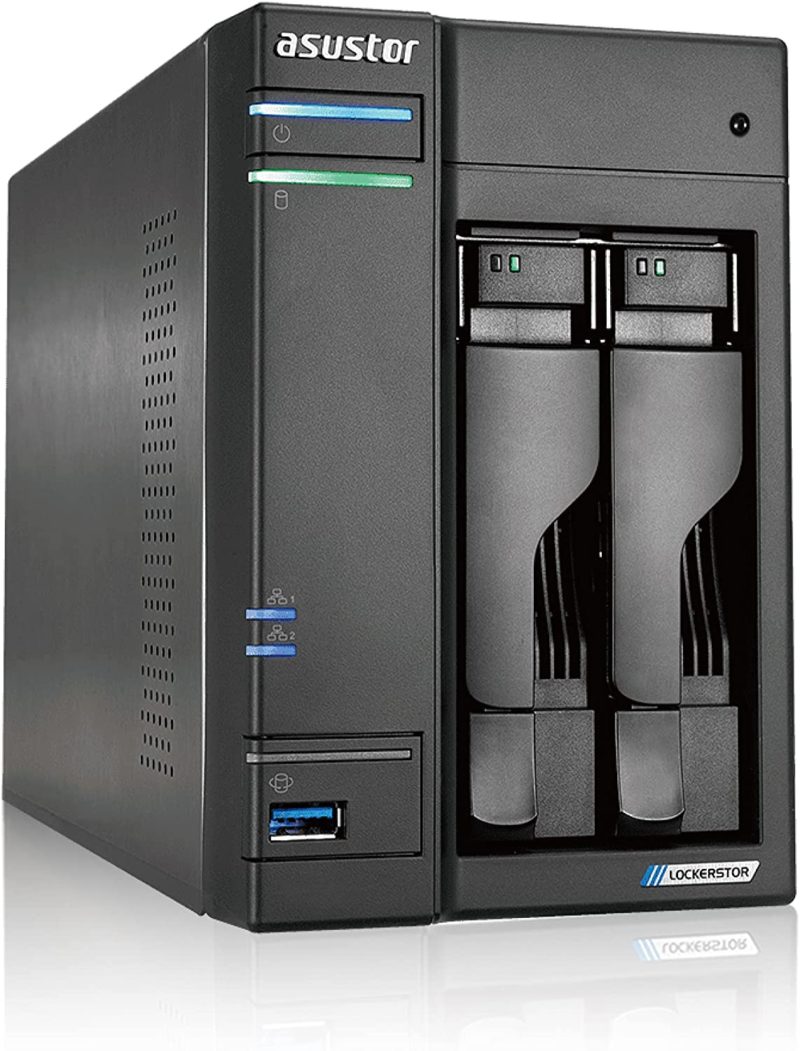
More details about the Asustor Lockerstor 2:
- Pricing: $359.00
- Check it out on: Amazon
Pros:
- Very powerful processor & ample RAM
- Easily upgradeable with more RAM or M.2 cache
- Full featured & ready for private or small business use
Cons:
- A bit costly for a two-bay device
The first personal cloud device on our list is the Asustor Lockerstor 2. While the price is a bit on the high end for a two-bay cloud storage solution, it manages to offer you your money’s worth with the hardware and features it brings to the table.
Starting with a peek under the hood, the Lockerstor 2 is powered by a quad-core Intel Celeron processor that reaches clock speeds as high as 2.7 GHz. The unit is also equipped with 4GB of RAM, which can be easily upgraded with an off-the-shelf DDR4 memory stick to up to 8GB.
As a two-bay device, it can accept up to two drives, either 3.5” hard drives or 2.5” solid state drives for faster read and write speeds, for a total of up to 36TB of cloud storage.
Powerful and Upgradeable Personal Cloud Storage Device
Another possible upgrade that can be made to the Lockerstor 2 is the addition of up to two M.2 drives to allow for extremely fast caching. Perhaps you’ve noticed, when moving large or numerous files, that drives often have a massive burst of speed before settling into a much lower “cruising” speed. This is thanks to caching.
With the larger cache of fast storage provided by M.2 drives, your private cloud storage can move large amounts of data quickly compared to slower hard drive response times.
On the back, the Lockerstor 2 continues to impress with an HDMI output that includes 4k decoding hardware as well as dual 2.5-gigabit ethernet ports to allow for up to 5-gigabit networking.
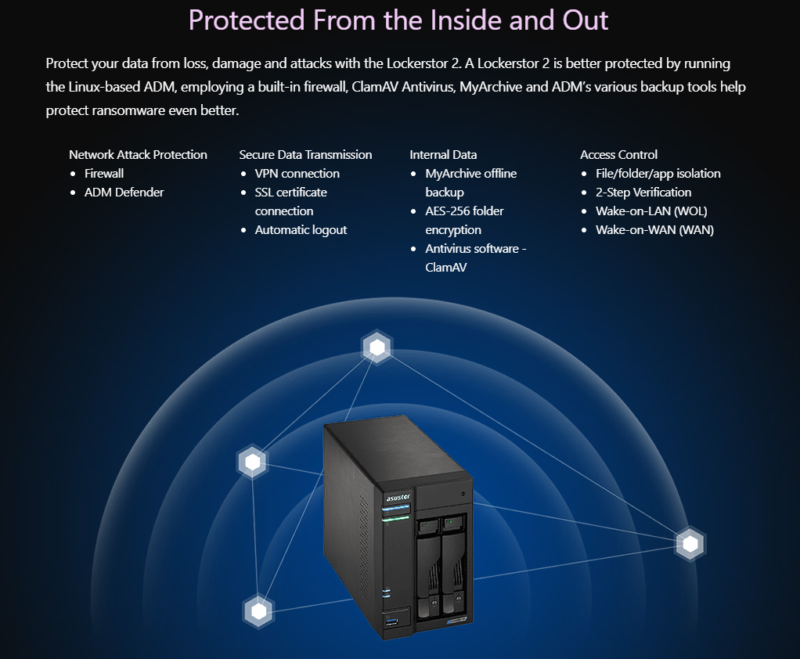
The powerful features and hardware offered by the Asustor Lockerstor 2 are geared toward power users and even entry-level small business use. Because of this, it isn’t the easiest personal cloud to set up. However, if you’re willing to spend the extra time and effort to get things off the ground with this device, you’ll have an excellent way to store and access your files from anywhere.
2. Synology DiskStation DS220j
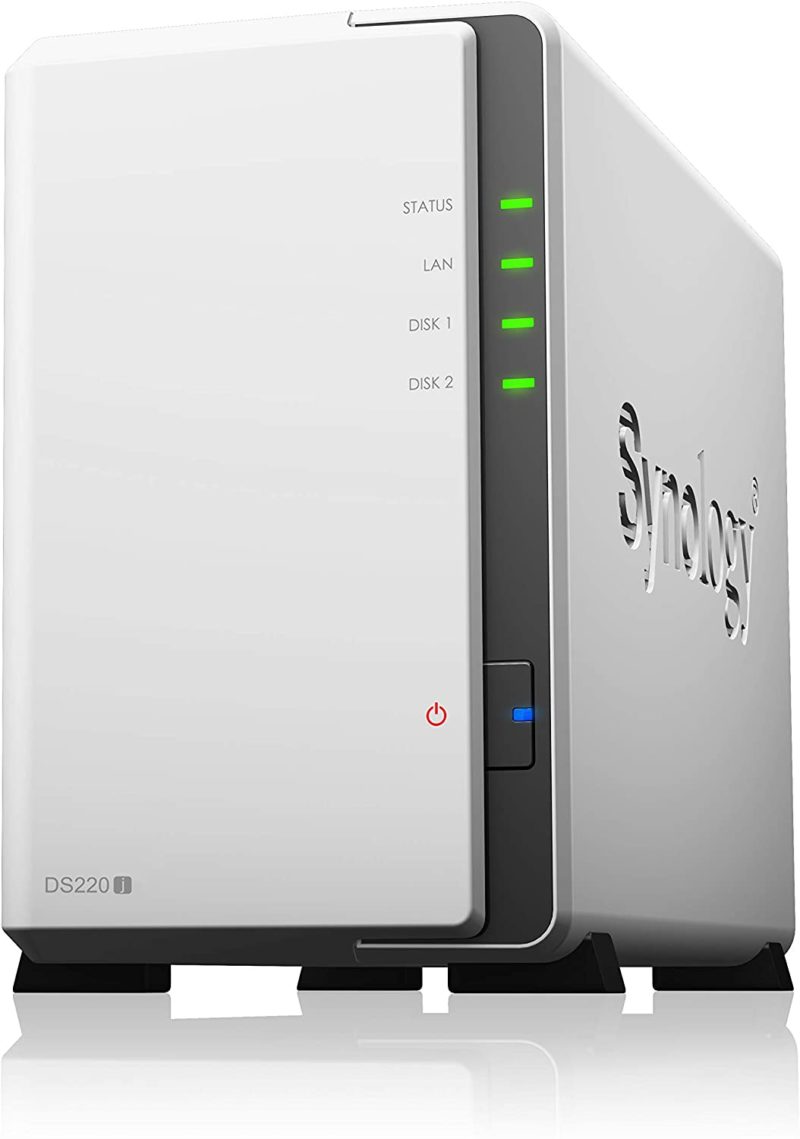
More details about the Synology DiskStation DS220j:
- Pricing: $150.00
- Check it out on: Amazon
Pros:
- Excellent price for the performance
- Several security-oriented features
- Easy-to-use apps & setup
Cons:
- Weaker processor & less RAM compared to other options
- Modest read & write speeds
For those who aren’t necessarily looking for the most powerful personal cloud storage device that money can buy, the Synology DiskStation DS220j is a well-rounded yet budget-friendly option. Similar to the Asustor model we just looked at, the DS220j is a two-bay storage device that can accept hard drives with up to 16TB of storage each for an impressive 32TB total capacity.
However, it only comes with 512MB of non-upgradeable RAM and a processor that only clocks up to 1.4GHz. It also lacks an HDMI port and only comes with a single 1-gigabit networking port, as well as a pair of USB ports.
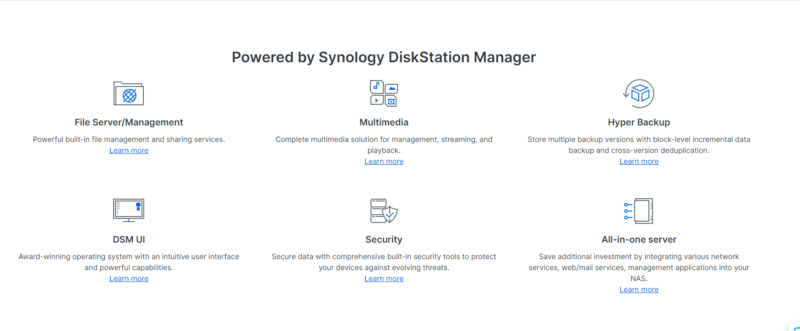
The DS220j actually comes out on top of the Asustor model in one important category: user-friendliness. It’s much easier to set up for most people and offers apps for mobile devices that gives you an intuitive way of syncing and accessing your stored photos, videos and music.
Synology also puts a lot of emphasis on security with features like two-factor authentication and support for several types of encryption to keep your files protected.
Excellent, Budget-Friendly Two-Drive Bay Option
Arguably the biggest draw of the DiskStation is that it comes at an excellent price for what it offers. For personal and home use, the modest processor and RAM is still good enough to provide reasonable performance, yet it comes in at less than half the cost of the Asustor model we just looked at. What’s more is that, even at half the price, it can still be outfitted to store just as much data as the Asustor model.
3. Terramaster F5-422 Network Storage Server
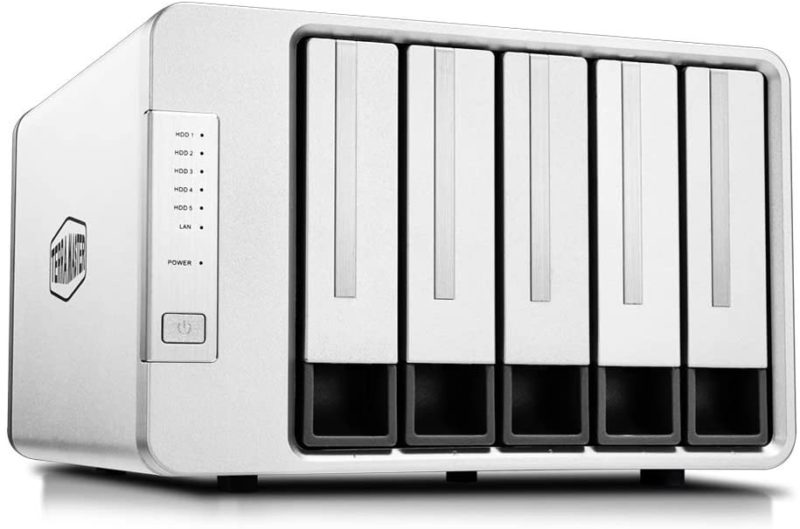
More details about the Terramaster F5-422:
- Pricing: Price not available
- Check it out on: Amazon
Pros:
- Up to 80TB storage capacity
- Read & write speeds over 600 MB/s
- 10-gigabit LAN port
Cons:
- Most expensive unit on our list
Moving back toward the “prosumer” end of the spectrum we have the Terramaster F5-422. This massive NAS has a whopping five bays so you can have as much as 80TB of personal cloud storage. While it only has a 1.5-GHz processor, the F5-422 can still handle dual 4K video encoding and decoding, making it a solid option for a personal entertainment system setup.
Terramaster also offers a wide array of features that give you full control over your files including things like encryption, file versioning, access rights, syncing and more.
Terramaster is broadly compatible for both Apple users and Windows users, making cross-platform file sharing very easy. You can also configure the F5-422 to sync with other cloud storage services such as Google Drive, pCloud or Dropbox.
Massive Storage Capacity With Extreme Speeds
Additionally, this model beats out the combined 5-gigabit bandwidth of the Asustor’s ports with two 1-gigabit and a single 10-gigabit port. With the proper setup, this port allows for read speeds as high as 670 MB/s and write speeds of up to 650 MB/s.
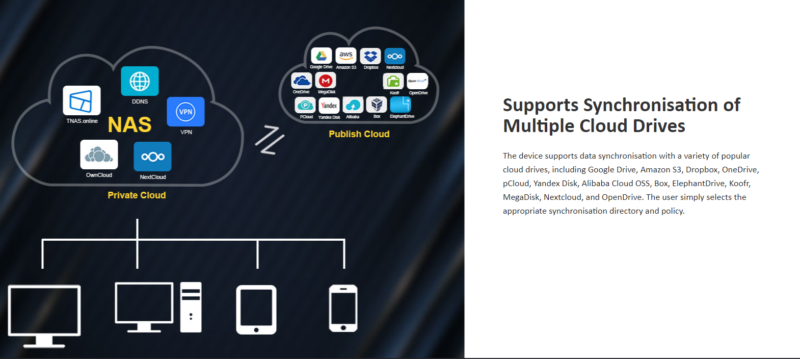
While the price will drive many away from choosing this particular option, if you need to keep a massive amount of data stored with solid security, or need to be able to access your stored files extremely quickly, the Terramaster is hard to beat.
4. Western Digital My Cloud Home Personal Cloud
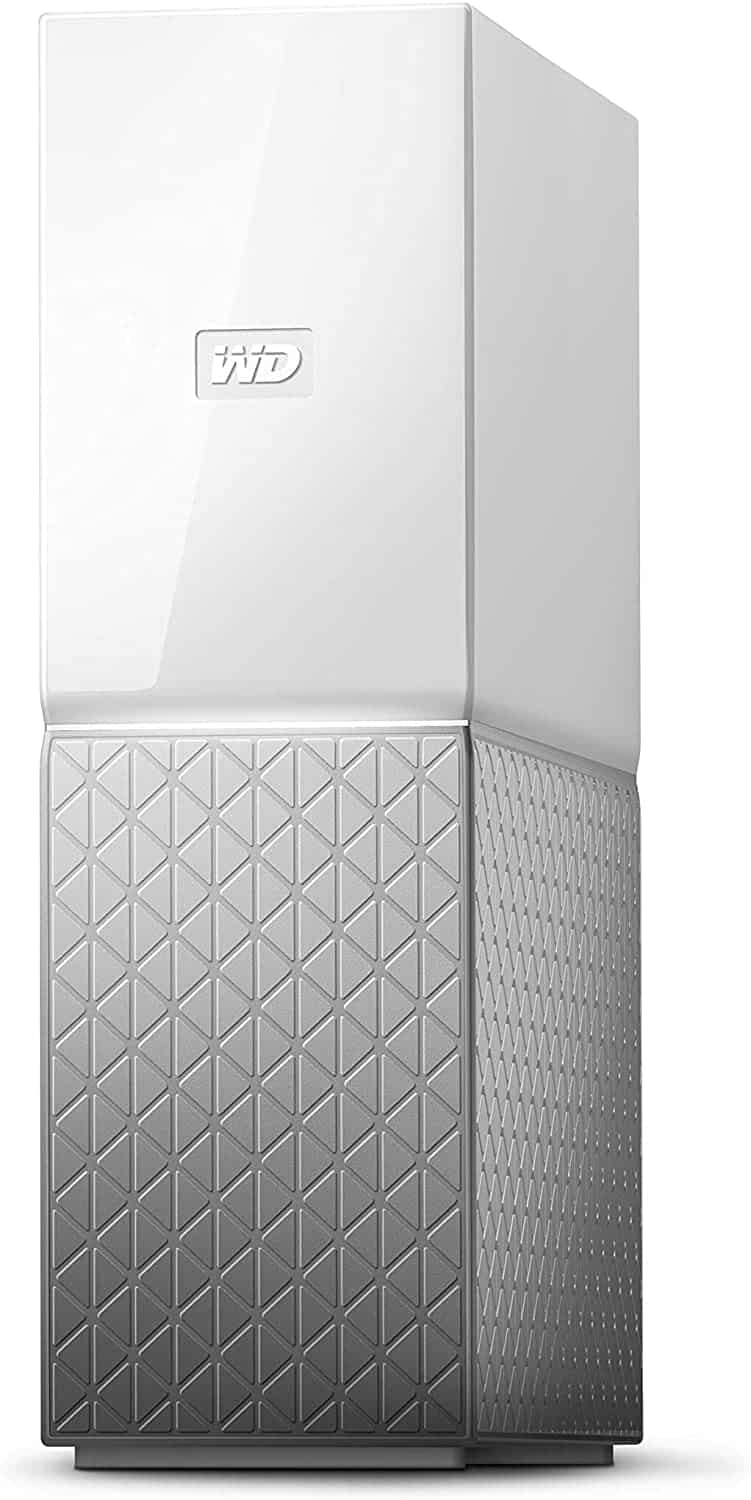
More details about the Western Digital My Cloud:
- Pricing: $169.99 for the 4TB model
- Check it out on: Amazon
Pros:
- Affordable pricing
- No need to mount hard drives yourself
- Easy-to-use apps
Cons:
- Relatively limited storage capacity depending on model
- Comparatively slower read & write speeds
- Can’t be upgraded with larger drives
Every cloud storage NAS we’ve looked at so far has several drive bays and you are required to purchase separate hard drives and install them yourself. While this isn’t a terribly difficult task, some people are looking for a plug-and-play solution for their personal cloud storage. This is what Western Digital’s My Cloud offers with several models ranging from 2TB to 20TB, all with built-in storage.
User-Friendly Cloud Storage Solution
Western Digital provides syncing and backup software for most operating systems including Windows and MacOS, as well as apps for mobile devices including Android and iOS that allow you to easily set up and use your My Cloud from any device.
Western Digital’s My Cloud also supports automatic backup from all of these apps, making it a great way to backup an unlimited number of devices without a recurring subscription.
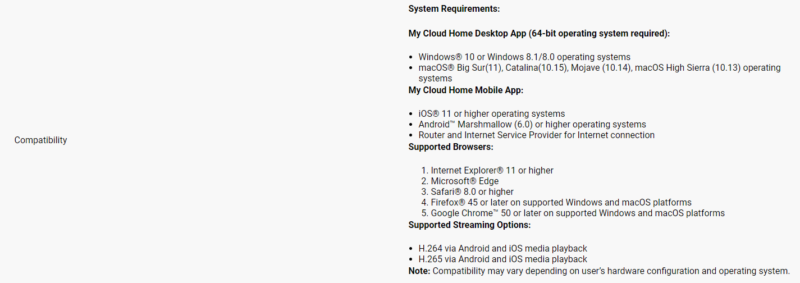
The intuitive software and extremely streamlined setup make this a great entry-level personal cloud storage solution for new users that need some free storage or want an easy way to backup and manage their files locally.
5. QNAP TS230
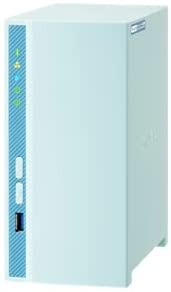
More details about the QNAP TS-230:
- Pricing: Price not available
- Check it out on: Amazon
Pros:
- Excellent photo organization software
- Competitively priced
Cons:
- Middling processor & RAM specs
- Only 1-gigabit networking
The QNAP TS-230 spec sheet won’t be turning any heads. It has a modest 2GB of memory and a quad-core processor that only clocks up to 1.4 GHz. This two-bay NAS has a single 1-gigabit ethernet port and no HDMI port. However, where this device shines is in the software provided by QNAP.
Easy Organization With QuMagie
QNAP offers software for desktop and mobile devices called “QuMagie” that is an AI-powered photo organization software. Similar to what you might have already seen happening in your camera roll, QuMagie can identify faces and objects to help you automatically sort your photos. For example, a bunch of pictures of your pet might be sorted into its own folder, and all your pictures of a relative will be automatically sorted into another.
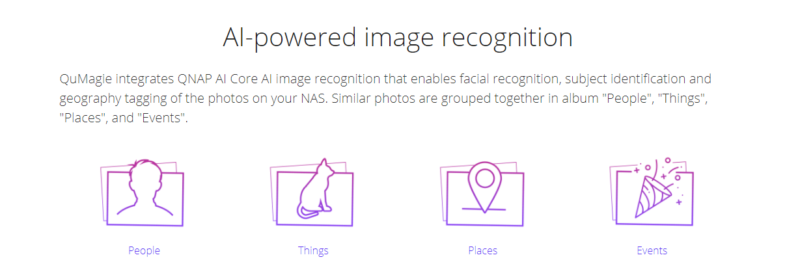
QuMagie also makes it easy to automatically back up your devices from anywhere and is even compatible with iOS live photos. Despite lacking the power to be a workhorse like some of the other personal cloud storage devices we’ve seen in this list, QuMagie makes the TS-230 an interesting choice that stands out among the competition.
Final Thoughts
Every one of the personal cloud storage devices we’ve looked at offers at least the basics, but they run the gamut when it comes to cost, power and features. At least one of the devices we’ve looked at should pair well with almost anyone’s needs, whether it be storing family photos or something more professional.
If you are looking for a secure online storage service for your files and documents, be sure to check our best cloud storage for personal use.
Still not sure about which device is right for you? Have you used one of the personal clouds we’ve looked at, or perhaps another model entirely? Let us know about your experience in the comments below. As always, thanks for reading.
FAQ
NAS stands for network attached storage, because the device is attached to your home’s WiFi network. Personal clouds are a type of NAS that has the added benefit of being able to communicate with other devices over the internet, meaning that they can be accessed remotely from anywhere, just like normal cloud storage.
External hard drives must be plugged into a computer or other device in order to be used, whether you’re moving files onto or off of it. With a personal cloud storage device, you can access the files from devices without having to be plugged into it, or even be anywhere near it.
Personal cloud storage offers several benefits over normal cloud storage services. You no longer have to pay a monthly fee, you are in control of how your files are stored, and your files aren’t being uploaded to a server owned by someone else with tons of other people’s files.
